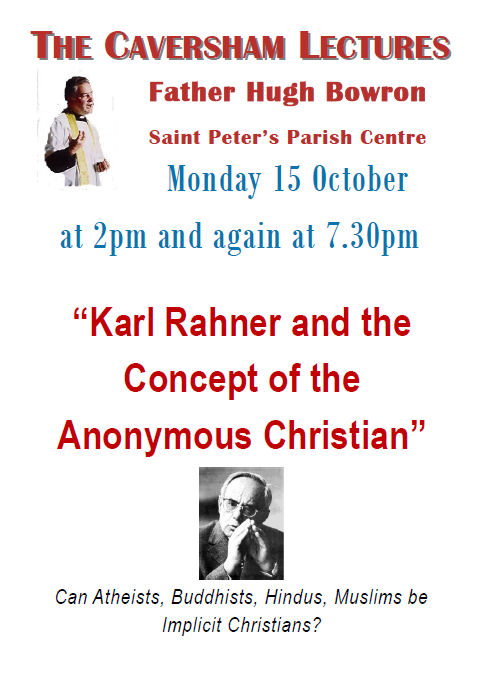Karl Rahner and the Concept of the Anonymous Christian

 Father Hugh Bowron, 2012
Father Hugh Bowron, 2012Can Atheists, Buddhists, Hindus, Muslims be Implicit Christians?
Karl Rahner was perhaps the most powerful speculative mind of 20th century catholic thought. He believed that God has planted his grace at the heart of every human life that has ever been, so that his presence is there, even if people are not aware of it. He was acutely aware that billions of human beings had existed before the time of Moses and Jesus - were they eternally lost, even though they had never had a chance to hear the Christian message? And what of the many, many people who now conscientiously follow the path of the major world religions? And as unbelief spread through western culture where did that leave idealistic atheists who worked for the betterment of humankind, or the many people left adrift in the religiously indifferentist Atlanticist world where the Church and its message never reached?
Rahner believed he had a pastoral response to this that was saying a great deal more than just the superficial "all good people go to heaven." So great was God’s desire to give himself completely to every human being that his grace could justify a person, could play out the drama of salvation in what he called an unthematic way, as each person responded to the ethical choices before them, and tried to reach up to the horizon of possibilities of their life. In fact human beings have a pre-apprehensive grasp of what God is about, even if they don’t put it into words and ideas, and an inbuilt momentum to try and live out what God wants of them. So it might well be that apparent unbelievers, who had no contact with the Church, might have an underground faith in Christ, played out in their secular context.
But where did this leave the significance of Christian mission and evangelism, what was the point of being a Christian, and what did Divine revelation amount to? Did loving your neighbour replace the need to love God? These were just the start of the controversial questions raised by Rahner’s "Anonymous Christian" concept.
The paper will also say something about Rahner’s life, the major influences on his theology, and some of his major enduring contributions to contemporary theology, apart from this topic. He is one of the most fascinating and interesting theologians of the 20th century.
Monday 15 October, 2 pm in the Saint Peter’s hall, repeated at 7.30 pm that evening in the same location.
57 Baker Street, Caversham, Dunedin, New Zealand +64-3-455-3961 : or e-mail us
